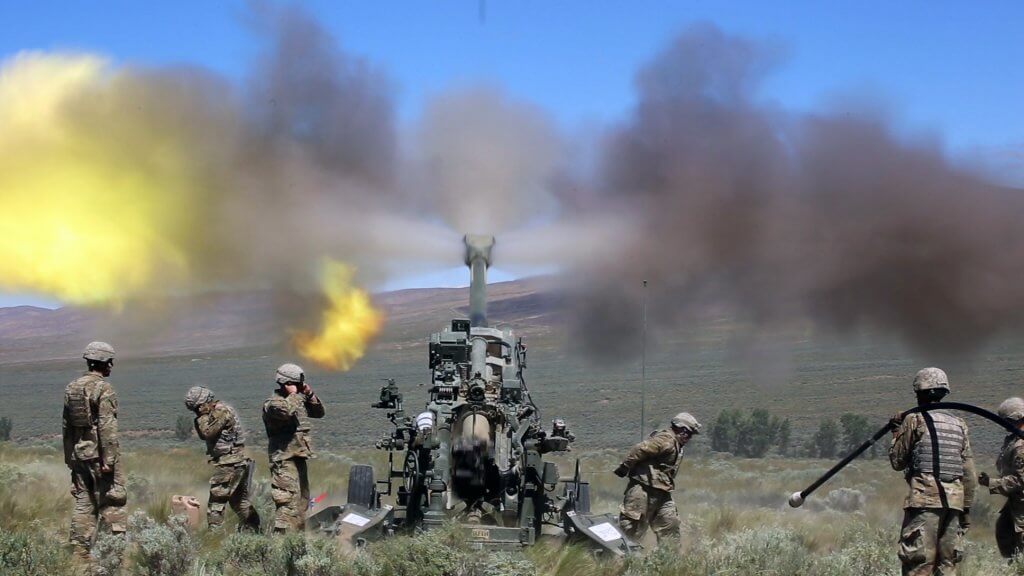While this summer’s National Guard Annual Training will still focus on preparing soldiers and airmen to be “Always Ready, Always There” — both near and afar — AT plans for many of the 54 units across the country look a little different in these unprecedented times.
The Guard has been busy recently, to say the least, with more guardsmen mobilized in 2020 than at any time since World War II. Troops have been called on, in particular, to meet the demands of COVID-19. Washington National Guard State Public Affairs Officer Joseph F. Siemandel said the strain of the pandemic has affected his unit’s readiness, training, and “everything else,” and 2021 has not seen a slowdown.
“A lot of people will probably not be doing the AT training this year because they have been on full-time COVID orders of some kind, they have done civil unrest missions, they have done a thick of things at this point. It’s been a fascinatingly busy year already and we are only two and a half months in.”
He noted that there will be more individualized training among all of the different units, and credentialing, courses, and professional development will all be priorities in Washington State.
The Aviation Unit will use AT time to focus on state missions and will do training with the Washington Department of Natural Resources’ helicopter crews that do bucket drops during wildfires. Siemandel said many guardsmen will aim to get the Incident Qualifications Card (Red Card) so they are certified to support wildfires since “In the last eight years we have had three of the worst fire seasons we have ever had in the state.”
Joint Force Headquarters will take part in Cascadia Rising 2022, a national exercise focused on massive earthquake response.
“When we are planning things, we want to make sure our guardsmen know that our state missions are just as important as our federal missions,” said Siemandel. “We need to make sure we have a force that is ready to deploy overseas but also ready to deploy here in the state.”
Meeting needs overseas
Col. Felix Rodriguez, director of operations for the Florida National Guard, said several ATs for the state’s units have been changed to COVID-19 support — including testing and vaccinations — based on citizens’ needs, but there is an emphasis on mobilization for others.
The 53rd Infantry Brigade Combat Team will get to experience working with host nations as a part of Defender Europe, including “practicing everything they need to do to get a unit overseas, like getting all of the equipment on a boat and then completing the mission with the host nation.”
Specifically, they will be participating in the exercise Immediate Response, focused on reception, staging, onward movement, and integration along with integrated air and missile defense. The IBCT and all of its assigned battalions will deploy into the Western Balkan Region and Greece to conduct platoon–level live fires, company–level Situational Training Exercises, and other training and sustainment exercises alongside the partners and allies in Albania, Bosnia and Herzegovina, Croatia, Greece, and North Macedonia.
A federal focus
In Maine, soldiers and airmen have been active in their support of COVID operations, assisting in Washington D.C., and deploying at home and globally. Many guardsmen have been supporting both testing and vaccination, as well as conducting voluntary case mapping for the Maine CDC, ongoing warehouse operations, and PPE distribution.
This community support has been crucial, but Maj. Carl Lamb, public affairs officer for the Maine National Guard, pointed out that his unit also understands the importance of continuing to train for federal missions.
This AT season will include groups heading to Vermont to take advantage of the ranges at Camp Ethan Allen Training Site and doing some road improvements and campsite preparation at a new training site that is beginning construction near Woodville, Maine.
Soldiers will also be adding details to a past Innovative Readiness Training (IRT) project in Kittery at Wood Island, including ADA requirements such as ramps, pier decking, and handrails.
“IRTs, whether based in engineering, medical, or transportation fields, are a tremendous benefit to both the military and our communities,” said Lamb. “They provide opportunities to train to our federal mission and combine them with community needs. In the past, we’ve done several community ballfields and a school playground, as well as some work for approved non-profits. It’s a tremendous two-for-one benefit, and we hope to do more varied projects for other community requestors in the coming years.”
Cross-training opportunities
Despite COVID-19 precautions, Camp Ripley Training Center in Minnesota has been busier than ever, including a full schedule of bookings this summer. Chief Warrant Officer 2 Kristin Tritz, a special projects officer for Camp Ripley, attributes this to 53,000 available acres of space for units to spread out and maintain distance.
Another benefit, she said, is the ability for diversity and cross training. This summer aviation unit 3-126th Aviation Battalion from Massachusetts will work with the 147th Field Artillery Regiment (MLRS) out of South Dakota on sling load operations.
North Dakota 164 RTI, the engineer subject matter expert for the Guard, will come to do engineer tasks, working across the units on post to allow them to exercise their bridges and meet their commander’s intent.
“As an organization, you can always train for your tasks, but to have the opportunity to actually exercise them with another unit is a great advantage,” said Tritz.
Tritz added that it’s all about creating customized plans, which seems to be the consensus for how AT is being handled in this uncertain season.

